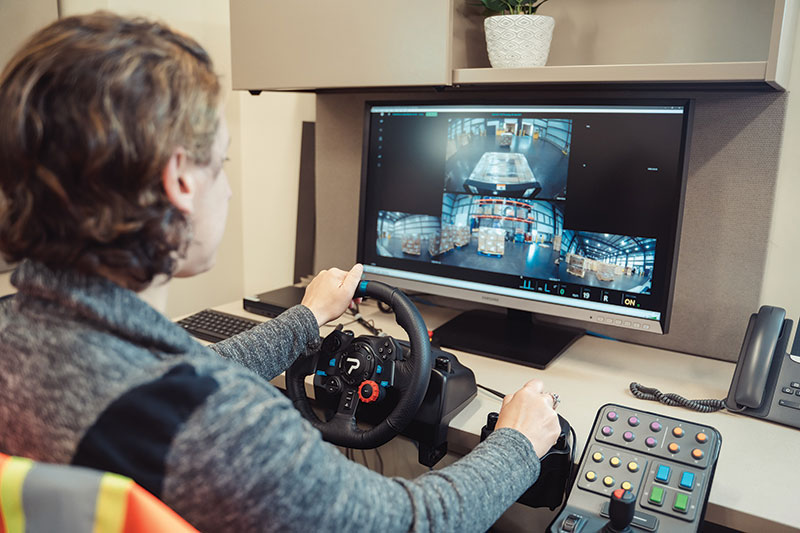Let’s face it, the biggest struggle many companies with fulfillment operations are facing when it comes to managing their lift tr...
Let’s face it, the biggest struggle many companies with fulfillment operations are facing when it comes to managing their lift truck fleets is finding and retaining enough operators.
Sure, solutions liketelematics and fleet management software are central to learning more about fleet costs, use patterns and operator behavior, but telematics can’t solve the issue of not having enough skilled people in the first place. That’s where remote operation technology enters the picture.
![MMH2204_LTT_Remote_Phantom_800px.jpg]()
Remote operation software allows qualified operators to safely control and operate lift trucks from thousands of miles away. This solution broadens the pool of labor available to staff sites and fleets while making it simple to reallocate drivers to different sites, explains Elliot Katz, co-founder and chief business officer for Phantom Auto, which offers a remote operation solution for lift trucks and other logistics vehicles.
The company’s platform was recently nominated as a finalist by MHI for a 2022 MHI Innovation Awardin the Best New Product category. In January, it landed $42 million in a funding round with participation from major logistics services providers NFI and ArcBest. Remote operation of lift trucks is gaining interest, adds Katz, because of the acute difficulties companies are facing in finding enough lift truck operators for their various sites.
“The status quo of having operators physically show up each day at a site to operate a forklift just isn’t working, to the tune of some companies having hundreds or even thousands of openings,” says Katz. “Companies have raised wages but are still having extreme difficulty in finding and keeping enough operators. With our platform for remote operation of lift trucks, we decouple labor from location, which means our customers can hire operators who reside anywhere, not just in commuting distance to one facility. That creates a far larger talent pool to draw on for hiring, and it helps retain them, because remote operation enables an attractive, high-quality work environment.”
Phantom’s platform can tie into newer electric lift trucks whose on-board control system is compatible with drive-by-wire operation, which includes many makes and models available in the industry today, says Katz. In practice, most of Phantom Auto’s customers place a team of remote operators in an office location, rather than having them work from home.
Since the operator is sitting at a computer and not in a truck, it eliminates common physical dangers to the operator such as collisions or incidents of materials falling onto trucks fromrackpositions.
“We’ve primarily drawn interest in our solution because of how acute the labor shortage is, but there are other benefits besides attracting and retaining more operators,” says Katz. “From a safety standpoint, the operators are no longer in harm’s way and become desk workers, and that typically results in a major reduction in the cost of workers compensation insurance premiums.”
Remote operators with the proper certifications and training can instantly switch from operating a lift truck used in one area of a facility to another located across the site. For large facilities, says Katz, this can be genuine time savings that helps with productivity.
Drivers at a remote operation center can be instantly reassigned to operate lift trucks at different sites to help companies cope with seasonality and demand surges, adds Katz.
“With our platform, if there’s suddenly a major demand surge for a warehouse you have in New Jersey, you can press a button, and on demand, have five, 10, or 15 remote operators to help deal with that surge,” Katz adds. “Then when demand stabilizes, they can be reassigned—instantly and on-demand— to another location.”
Remote operators still need proper training and certification, but the office and computing nature of the work can attract digitally inclined workers who might not ever consider working inside of a warehouse, or extend the career of operators who have injuries, or no longer want to work in a physically demanding warehouse environment.
When Phantom announced its recent funding round, the backing from NFI and ArcBest included remote operation platform use commitments. The two companies agreed to deploy thousands of Phantom-enabled forklifts in the coming years.
As Sid Brown, NFI’s CEO stated at the time: “Our employees are our most important asset, and without them we would not be able to serve our customers. With the elimination of having to physically be on site, we can attract more diverse candidates that do not live within driving distance of the warehouse, live in alternative time zones, or who may not have been interested in working in a warehouse environment.”
Katz does note that major companies are taking a “multi-pronged” approach to dealing with lift truck operator shortages, including using some fully autonomous lift trucks for certain workflows. But Katz sees remote operation by human operators as a key part of the playbook, given what he says are some limitations with applying fully autonomous trucks for every situation, and the scale of the challenge in reliably staffing fleets.
“Remote operation is moving from a nice-to-have to a have-to-have solution for more companies,” he says. “And importantly, this is human-centric technology that both makes employees jobs better while also simultaneously increasing efficiency and productivity for the employers.”







 粤公网安备 44010602003952号
粤公网安备 44010602003952号